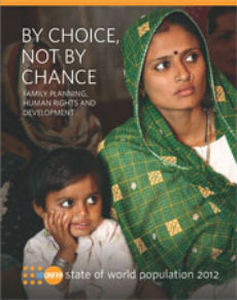|
21/11/2012 A Week before COP18's gender day: why meeting the unmet family planning need is key for human rights, gender equality - and tackling climate changeRead Now The State of World Population Report 2012 Credit: UNFPA The State of World Population Report 2012 Credit: UNFPA The most important point made in the recent UNFPA report, The State of World Population 2012 - perhaps even its foundation - is that access to family planning is a human right. If it can be realised globally, this will be a big step not only in terms of environmental sustainability but also and more importantly, reducing poverty, exclusion, poor health and gender inequality. It is a travesty and an abuse of human rights that there are currently 222 million women without access to family planning who want it, largely for lack of a few billion dollars per year - about a tenth of the tobacco industry's annual profits. According to the UNFPA's Press Release which accompanied the report's release, making voluntary family planning available to everyone in developing countries would reduce costs for maternal and newborn health care by US$11.3 billion annually, as well as helping to stabilise the global population more quickly. In the longer term this would contribute reducing climate change (although this is not at all to imply that consumption is not at least as or probably much more important) and problems of resource scarcity. In addition to finance, to ensure that every person’s right to family planning is realised, the report also calls on governments and leaders to:
Family planning delivers immeasurable rewards to women, families, and communities by enabling healthier, longer lives. If an additional 120 million obtained access to family planning - just over half of those who currently don't have access and want it - the report estimates 3 million fewer babies would die in their first year of life. The State of World Population 2012 says that governments, civil society, health providers and communities have the responsibility to protect the right to family planning for women across the spectrum, including those who are young or unmarried. But financial resources for family planning have declined globally and contraceptive use has remained mostly steady. In 2010, donor countries fell US$ 500 million short of their expected contribution to sexual and reproductive health services in developing countries. Contraceptive use prevalence has increased globally by just 0.1 per cent per year over the last few years. Signs of progress In July, at the London Summit on Family Planning, donor countries and foundations together pledged US$2.6 billion to make family planning available to 120 million women in developing countries with unmet needs by 2020. Developing countries themselves also pledged to increase support. But, according to the report, an additional US$ 4.1 billion is necessary each year to meet the unmet need for family planning of all 222 million women who would use family planning but currently lack access to it. This investment would save lives by preventing unintended pregnancies and unsafe abortions.
0 Comments
Your comment will be posted after it is approved.
Leave a Reply. |
Details
Archives
February 2019
Tags
All
|
 RSS Feed
RSS Feed
